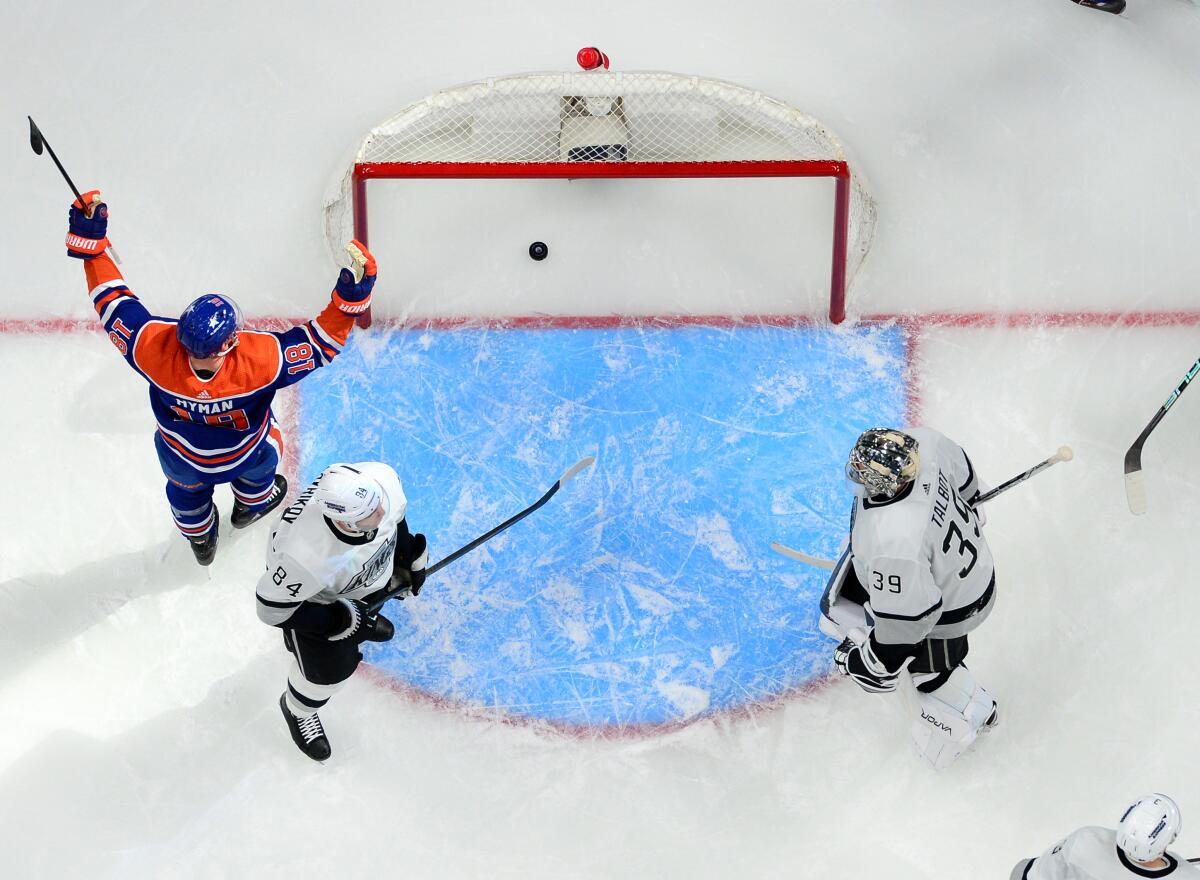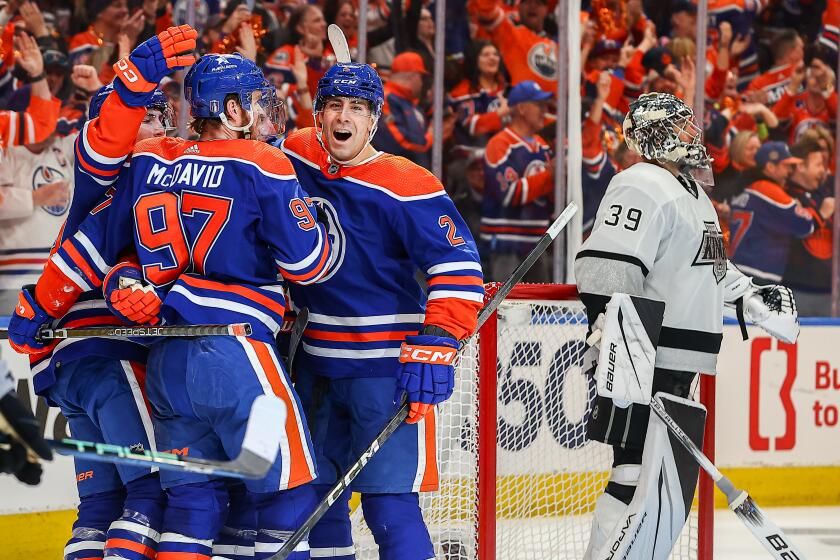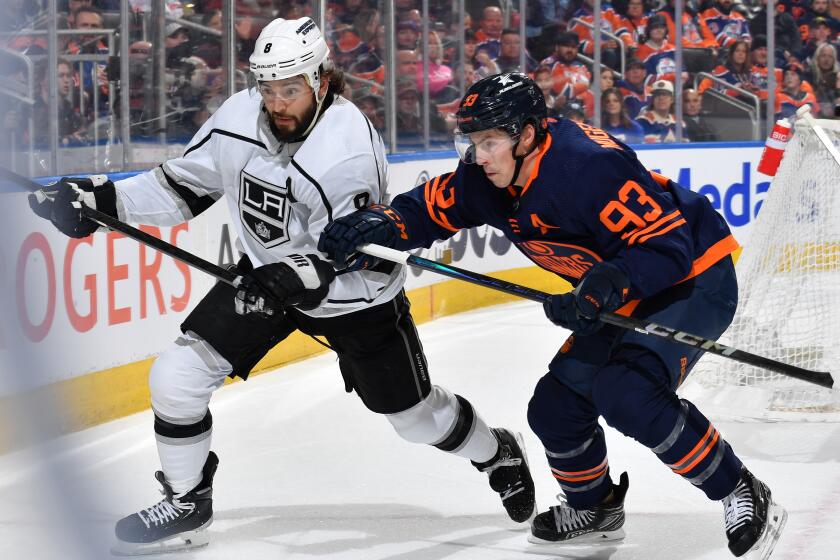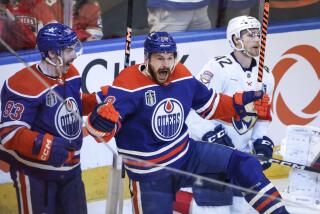Kings’ penalty kill, a strength all year, becomes weakness in deflating loss to Oilers

- Share via
EDMONTON, Canada — The Kings-Oilers NHL playoff series was supposed to be decided by the most elemental of showdowns: the unstoppable force versus the immovable object. In this case, Edmonton’s powerful power play versus the Kings’ effective penalty kill.
But in Game 1 on Monday, the Kings’ penalty kill produced only self-inflicted wounds, allowing the Oilers to score three times in a 7-4 Edmonton win that wasn’t nearly as close as the final score might indicate.
“It just shot us in the foot,” defenseman Drew Doughty said after the Kings stopped the Oilers only once in four power-play opportunities. “They’re just so good on the power play. So let’s just smarten up in that area.”
It’s not as if the Kings didn’t see that coming. As Doughty admitted after Monday’s debacle, the team “talked about their power play so much before this series.”
The Kings come out flat and fall behind early on their way to a Game 1 first-round loss to the Edmonton Oilers.
And with reason. Edmonton scored on more than 26% of its man-advantage opportunities during the regular season, the best percentage in the Western Conference and fourth best in the NHL.
But the Kings gave up only 39 power-play goals, third fewest in the league; its 84.6% kill percentage ranking second in the NHL. Yet all that meant nothing in Game 1, with the Kings’ penalty kill giving up as many goals in a 20-minute span of the second and third periods as it did in the last nine regular-season games combined.
“Two things that have been, and are, strengths of ours are penalty kill and eliminating rush chances. It’s what we do well,” Kings coach Jim Hiller said. “And we didn’t do either of those well tonight.
“That’s the obvious. I think everybody saw that. We’ll have to fix that.”
The Kings have a lot to repair after watching Zach Hyman score a hat trick while Connor McDavid and defenseman Evan Bouchard combined for nine assists. Leon Draisaitl also had a goal and an assist, both coming on power plays.
The Kings got second-period goals from Mikey Anderson and Adrian Kempe and garbage-time goals from Pierre-Luc Dubois and Trevor Moore in the last four minutes, long after the outcome had been decided.
Even so, take away the Oilers’ power-play goals and the teams are even after three periods. Which is why Hiller’s advice to his team coming into the series was simple: stay out of the penalty box.

“It’s every team’s message, I’m sure,” he said. “We don’t want to put them on the power play. But when they do get on the power play, we want to make sure we just continue to do a good job, as we did in the regular season.”
Instead, the Kings reverted to the form they showed in the last two seasons when their penalty kill ranked in the bottom third of the league — something the Oilers took advantage of, scoring power-play goals in 11 of their previous 13 playoff games with the Kings, winning both first-round series.
This year, the Kings were supposed to have the special teams advantage. According to long-held hockey wisdom, if a team’s success, percentage-wise, in both killing penalties and scoring on the power play add up to more than 100, that team’s special teams are... well, special.
The Kings total in the regular season was 107.2, slightly better than the Oilers.
“It’s something that can be a difference throughout a game, throughout a series,” Anderson said. “We’ve lost the battle last couple years. Now it’s a new challenge, and a new start for us and a new start for them.
“Obviously, there’s a lot of other factors that go into it. But this time of year it’s hard to score five on five. Teams are tracking very tight. So it comes down to special teams, who can capitalize, who can keep the puck out of the net.”
On Monday, those special teams belonged to the Oilers, who scored on three of their four power-play chances and killed their only two penalties.
“We just couldn’t stop their power play tonight, for whatever reason,” Hiller said. “That makes it pretty tough. Once they get that kind of lead, it deflates you and makes it for a long way back.”
Edmonton was simply too fast and too skillful for the Kings. McDavid was unstoppable, with his line — one that had Adam Henrique on one wing and Hyman on the other — combining for four goals and seven assists.
The Kings and Oilers aren’t “Original Six” teams, but they’ve established a rivalry decades in the making forged by NHL stars and playoff showdowns.
“He’s the best skater in the world, probably,” Kempe said of McDavid.
“We have to be better on the PK,” he added. “We eliminate a couple of those penalties and don’t let them be [75%] on the power play, I think it’s a more even game.”
Hiller promised his team would play to its strengths — which include the penalty kill — in Game 2 on Wednesday. He really doesn’t have a choice, because in Game 1 the only victims of the Kings’ penalty kill were the Kings.
“These are things that are fixable for us,” Hiller said. “That’s really the point. We can fix those things; we usually do those well.”
If they don’t, the Kings immovable object could be looking at another early playoff exit.









